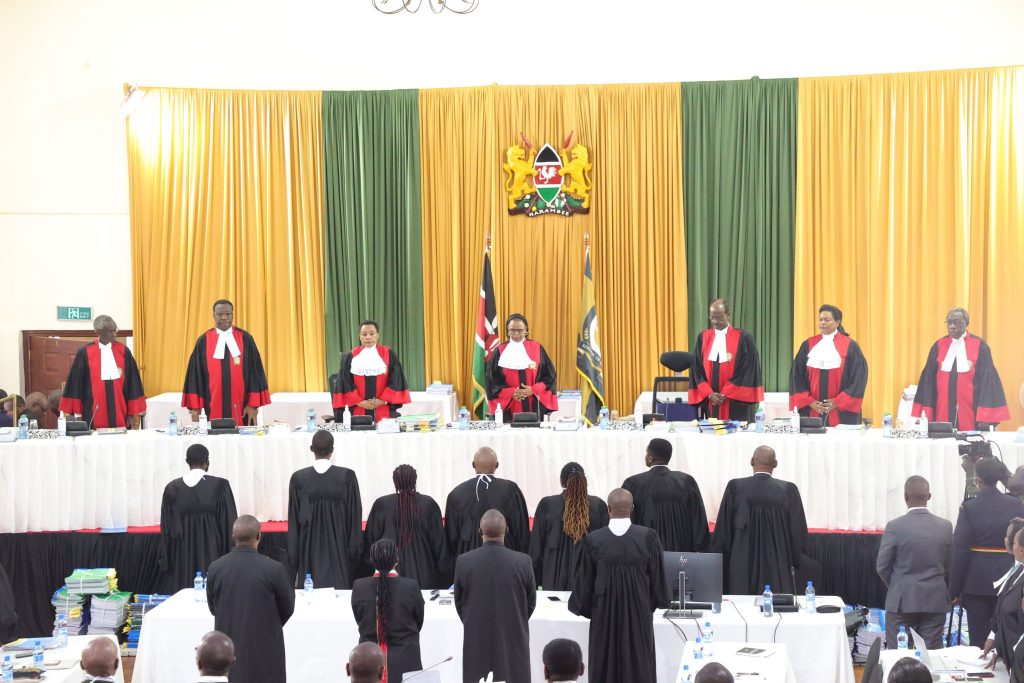The Supreme Court of Kenya Monday afternoon unanimously upheld the election of President-elect William Ruto in the August 9th presidential poll.
“We declare the election of the 1st Respondent as president-elect to be valid under Article 143 of the constitution,” said Chief Justice Martha Koome who read the ruling of the seven judges.
The court dismissed all the nine issues that it had singled out for deliberations.
Martha Koome started by saying that the reactions following the declaration of the 9 August election show that IEBC has not yet garnered universal public confidence and trust in the management of elections.
However, the court said the company didn’t affect the outcome of the presidential results since 86,889 voters were granted the right to vote manually, where the technology failed. This, the court said, happened successfully.
“We are not persuaded that the standards of IEBC’s technology failed the test,” CJ Koome said. “Whereas it is true that kiems kits failed in 235 polling stations, 86,889 voters were granted the right to vote manually and the requisite forms 32A were successfully filled.”
The court dismissed the petitioners’ claims that the Results Transmission System was compromised to disadvantage Odinga.
“No credible evidence was presented to prove that anyone accessed the RTS to intercept, detain or store forms 34A temporarily before uploading to the public portal,” the judgment stated.
“In our considered view there was no evidence of a man in the middle server,” the Chief Justice read.
The court said that the audit report of the 40 polling stations sampled showed no significant difference in form 34A in the portal and the physical forms given to agents that could affect the credibility of the election.
“The forms that were scrutinized for the 41 polling stations were similar to those original forms used by the IEBC,” CJ Koome said.
Further, the court ruled that there was no evidence of suppression of voters due to the postponement of election in Mombasa and Kakamega Counties and several other areas.
“IEBC had the power to postpone elections. The petitioners did not prove that IEBC acted in bad faith. No empirical data to conclude that postponement affected voter turnout,” CJ Koome said.
The Chief Justice reprimanded the petitioners’ lawyers for presenting false evidence in court.
“Affidavits filed in court must only deal with facts. Swearing to falsehoods is a criminal offence,” CJ Koome said.
In addition, the apex court ruled the disagreement of the IEBC commissioners did not affect the outcome of the result. In its verdict, the court said that the four commissioners actively participated in the verification and tallying process up to just before the announcement.
The judges said they were satisfied that the divisions apparent between the chair and the 4 commissioners notwithstanding, IEBC carried out the verification, tallying and declaration of results in accordance with Articles 138 (3c) and (10) of the constitution.
“Are we to annul an election based on a last-minute boardroom rupture? This we cannot do,” the Chief Justice said.
The court also dismissed the pensioners’ claims that Ruto didn’t attain the 50%+1 constitutional threshold. Like in 2017, the Supreme Court reiterated that rejected votes cannot be included when calculating 50%+1.
Chief Justice Martha Koome said that the court will give the full judgment after 21 days.
Shortly before and after the verdict, leaders of various factions reacted to the petition, with Martha Karua and Raila Odinga conceding defeat.
“The court has spoken. I respect but disagree with the findings,” Karua tweeted.
Odinga issued a statement saying he respects the verdict although he disagrees.
“We have always stood for the rule of law and the constitution. In this regard, we respect the opinion of the court although we vehemently disagree with their decision today,” Odinga tweeted.
The former premier said his lawyers proffered irrefutable evidence and the facts were on their side, although the judges saw it otherwise.
“We find it incredible that the judges found against us on all nine grounds and occasion resulted in unduly exaggerated language to refute our claims,” the statement read.
However, Odinga said that the verdict has inspired him and his supporters to “redouble our efforts to transform this country into a prosperous democracy where each and every Kenyan can find their full belonging.”
He promised to communicate his next move in the near future in what he said is the quest for the struggle for transparency, accountability and democracy.
William Ruto tweeted a Bible verse, Mark 10:27, saying ” With men, it is impossible, but not with God: for with God all things are possible.”
